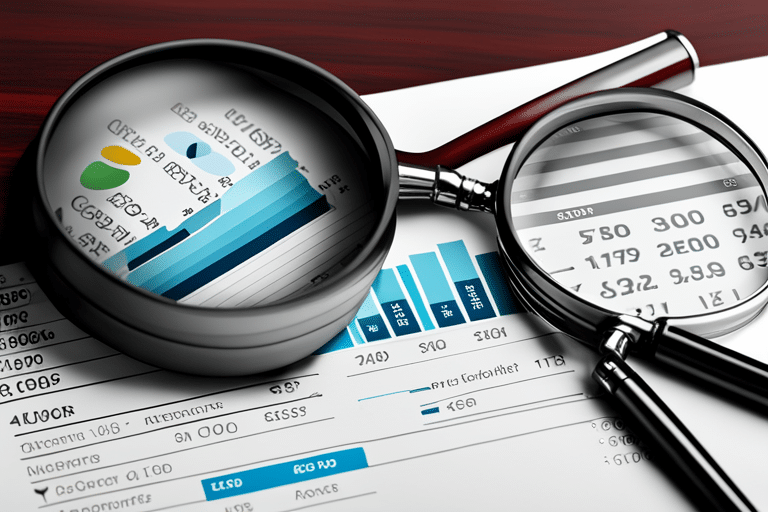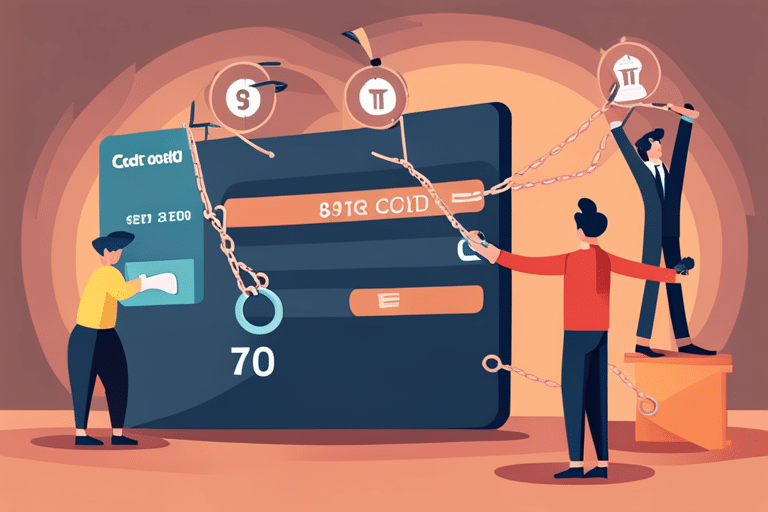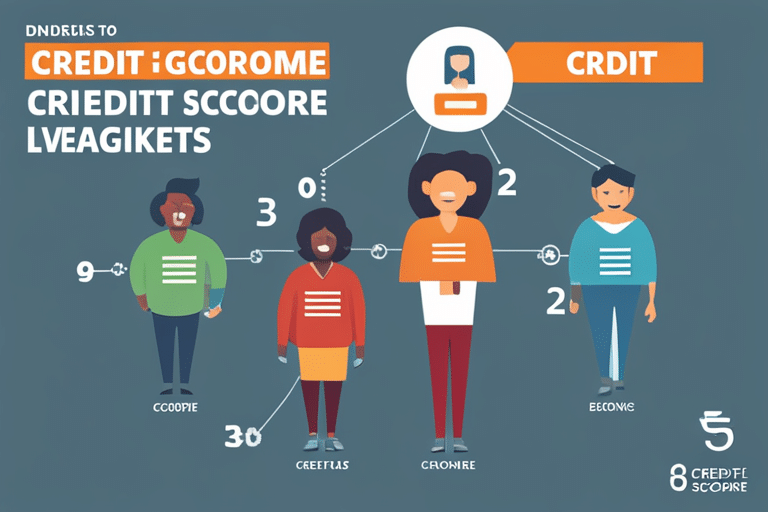Hey, you! Ready to dive into the wild world of credit scores?
Buckle up because we’re about to expose some mind-boggling misconceptions. Get ready to have your mind blown as we debunk myths left and right, leaving no stone unturned.
Think checking your credit score lowers it? Wrong! We’ll unravel the truth behind credit reports and scores, revealing what really impacts those magic numbers.
So sit back, relax, and prepare to master the art of credit scores like a pro. Let’s bust some myths together!
Key Takeaways
- Checking your credit score has no impact on it whatsoever.
- Monitoring your credit can bring benefits like early detection of errors or fraudulent activity.
- Paying bills on time positively affects your credit score.
- Keeping credit utilization low can boost your credit score.
The Difference Between Credit Scores and Credit Reports

Credit scores and credit reports may sound similar, but there are important differences between them. Let’s dive into the exciting world of credit to understand why these two terms often get mixed up.
First off, let’s talk about credit scores. This magical number is like a report card for your financial life. It tells lenders how likely you are to repay your debts. Think of it as a grade that determines whether you’ll get that shiny new car or have to settle for a rusty bicycle.
Now, how is this score calculated? Well, it’s a mysterious blend of various factors like payment history, amounts owed, length of credit history, types of credit used, and new credit inquiries. It’s like trying to solve an intricate puzzle with missing pieces scattered all over the place. But fear not! There are experts out there who crack this code and provide us with our precious three-digit score.
On the other hand, we have credit reports – detailed files that document your entire financial past. These reports list all your accounts and their respective balances, payment history (good or bad), any bankruptcies or liens against you, and even those pesky hard inquiries when you apply for new credit. Basically, it’s like your personal financial diary that gets shared with potential lenders.
So why are these reports so important? Well, they provide the raw data that goes into calculating your glorious credit score! Without accurate information in your report (and timely payments on top of that), no amount of wishing will magically improve your score.
Myth: Checking Your Credit Score Lowers It

So, you’ve always wondered if checking your credit score is like a game of Jenga, where every peek makes it crumble down? Well, fear not! The myth that checking your credit score lowers it is about to be busted.
In fact, not only does checking your score have no impact on it whatsoever, but monitoring your credit can actually bring some pretty sweet benefits to the table.
Checking ≠ Lowering Score
Don’t worry, checking your credit score won’t lower it. It’s time to debunk this common misconception and put your mind at ease. So go ahead, grab a cup of coffee and check that score without fear!
Here are some key things you need to know about credit score calculation and factors:
-
Payment history: Paying your bills on time is like sprinkling magic fairy dust on your credit score.
-
Credit utilization: Keep those balances low, my friend! High balances can make your score do a little dance in the wrong direction.
-
Length of credit history: The longer you’ve been juggling credit, the more confident lenders feel about giving you their stamp of approval.
-
Types of credit used: Mix it up! A healthy blend of credit cards, loans, and mortgages shows you can handle different financial responsibilities.
-
New credit applications: While a few new inquiries won’t hurt, too many in a short period might raise some eyebrows.
Credit Score Monitoring Benefits
Monitoring your credit score comes with several advantages that can help you stay on top of your financial health. By utilizing credit score tracking and credit score monitoring services, you can gain valuable insights into your creditworthiness and take proactive steps to improve it.
Here’s a handy table to showcase the benefits of credit score monitoring:
| Benefits | Description |
|---|---|
| Early detection | Identify any errors or fraudulent activity in real-time |
| Credit education | Understand the factors influencing your score |
| Score improvement tips | Receive personalized recommendations for boosting your score |
| Financial goal tracking | Monitor progress towards achieving specific credit goals |
With these services, you’ll have a clearer picture of where you stand financially and be empowered to make informed decisions. Plus, it adds a touch of excitement to see how small changes in your financial habits can positively impact your credit health. So why not give it a try? Your mastery over your credit awaits!
Understanding the Factors That Impact Your Credit Score

Understanding the factors that impact your credit score can help you make informed financial decisions. Your credit score is like a mysterious creature, lurking in the shadows of your financial life. But fear not! I’m here to shed some light on this enigmatic subject.
So, grab a cup of coffee and let’s dive into the world of credit scores together.
Here are five key factors that can influence your credit score:
- Payment history: Paying your bills on time shows lenders that you’re responsible and reliable.
- Credit utilization: This is the amount of credit you’re using compared to the total available credit. Keeping this ratio low can boost your score.
- Length of credit history: The longer you’ve had credit accounts open, the better it looks to lenders.
- Credit mix: Having a diverse range of credit accounts (like loans, mortgages, and credit cards) demonstrates your ability to handle different types of debt responsibly.
- New inquiries: Every time you apply for new credit, it leaves a mark on your report. Too many inquiries within a short period can raise red flags for lenders.
Now that we’ve uncovered these hidden secrets, let’s talk about strategies for improving your credit score. It’s all about being proactive and taking control of your financial destiny. You can start by paying off any outstanding debts, keeping balances low on your credit cards, and avoiding new applications for unnecessary lines of credits.
The Truth About Credit Score Ranges

So, you’ve finally taken the plunge and decided to dive into the world of credit scores. Good for you!
Now, let’s talk about why credit score ranges are so darn important. We’ll also explore the factors that can affect these ranges and, most importantly, how you can improve those pesky low scores. Trust me, it’s not as daunting as it seems!
Score Range Importance
One misconception about credit scores is that the importance of score range is often misunderstood. To truly understand your creditworthiness, it’s crucial to grasp what each score range signifies. Let’s dive into this topic and debunk some misconceptions together!
-
Excellent Credit (800-850): You’re a financial superstar! Lenders will fight over you like seagulls fighting for french fries at the beach.
-
Good Credit (670-799): You’re a responsible borrower, but not quite on superhero status yet. Keep up the good work and watch your options expand!
-
Fair Credit (580-669): You’ve had a few hiccups along the way, but don’t worry, there’s still hope! It might take some extra effort to convince lenders, but they’ll give you a chance.
-
Poor Credit (300-579): Okay, things aren’t looking great right now. But fear not! With determination and smart financial choices, you can bounce back stronger than ever.
Factors Affecting Ranges
To truly grasp where you stand in the eyes of lenders, it’s important to be aware of the factors that can affect your credit score range. Your credit score is like a reflection of your financial life, and just like a mirror, it can show both your flaws and strengths.
The factors affecting credit ranges are numerous, but some key ones include payment history, credit utilization ratio, length of credit history, types of credit used, and new credit inquiries. Each factor plays a role in determining whether your score falls on the lower or higher end of the range.
Understanding these factors is crucial because they impact not only your ability to secure loans or get favorable interest rates but also how lenders perceive you as a borrower.
Now that you’re familiar with the factors affecting credit ranges, let’s dive into ways you can improve low scores.
Improving Low Scores
So, you’ve learned about the factors that affect credit scores and how they can vary. But what if your score is on the lower end of the spectrum? Don’t worry! There are ways to improve it and get back on track.
Here’s a handy list of tips to help you build credit and repair your score:
- Pay your bills on time: This shows lenders that you’re responsible.
- Keep your credit utilization low: Aim for using less than 30% of your available credit.
- Diversify your credit mix: Having different types of accounts (credit cards, loans) can boost your score.
- Limit new credit applications: Applying for too much new credit can negatively impact your score.
- Check your credit report regularly: Look out for errors or fraudulent activity that could be dragging down your score.
Debunking the Myth of a “Perfect” Credit Score

You shouldn’t believe that a ‘perfect’ credit score is the only way to achieve financial success. Sure, a high credit score can open doors and make life easier in many ways, but it’s not the be-all and end-all of your financial journey. In fact, obsessing over achieving a perfect score can sometimes do more harm than good. So let’s debunk this myth and take a closer look at credit scores.
Understanding credit score factors is crucial to demystifying the concept. Contrary to popular belief, your credit score isn’t just determined by one magical formula. It’s actually calculated based on various factors that lenders use to assess your creditworthiness. Take a look at this nifty table:
| Credit Score Factors | Weightage (%) |
|---|---|
| Payment History | 35 |
| Credit Utilization | 30 |
| Length of Credit | 15 |
| Credit Mix | 10 |
As you can see, payment history and credit utilization carry the most weight when calculating your credit score. This means that consistently making your payments on time and keeping your credit card balances low are vital for maintaining a healthy score. However, don’t fret if you don’t have a lengthy credit history or an extensive mix of different types of accounts – these factors contribute less to your overall score.
Now that you understand how your credit score is calculated and the relative importance of each factor, it’s time to put things into perspective. Aiming for perfection may seem tempting, but remember that having an excellent or very good score (typically above 750) is often enough to secure favorable interest rates and loan approvals.
Common Misconceptions About Credit Utilization

So, you’ve learned that having a ‘perfect’ credit score is just a myth. But now let’s dive into another common misconception about credit scores – credit utilization.
You may have heard some things about credit utilization that aren’t quite accurate. Let’s set the record straight with these common credit score myths:
-
Myth #1: Maxing out your credit cards will boost your score: Nope! In fact, maxing out your cards can actually hurt your score because it indicates that you’re using too much of your available credit.
-
Myth #2: Closing unused accounts will improve your score: Sorry, but closing those old accounts won’t magically make your score skyrocket. In fact, it might even lower your overall available credit and increase your utilization ratio.
-
Myth #3: Paying off all balances each month is harmful: This one couldn’t be further from the truth! Paying off your balances in full every month shows responsible financial management and can actually help improve your credit score.
-
Myth #4: Carrying a small balance boosts your score: Some people believe that carrying a small balance on their cards helps them build better credit. However, there’s no need to carry any balance at all if you pay on time and in full each month.
-
Myth #5: Utilization has no long-term impact on scores: While it’s true that utilization only affects your score temporarily (until the next billing cycle), consistently high levels of utilization over time can still have a negative impact on your overall financial health.
Now that we’ve debunked these misconceptions surrounding credit utilization, let’s move on to addressing the impact of multiple credit inquiries…
Addressing the Impact of Multiple Credit Inquiries

Now that we’ve clarified the myths about credit utilization, let’s explore how multiple credit inquiries can affect your financial health. Credit inquiries occur when you apply for new credit, such as a loan or a credit card. While it may seem innocent enough to shop around for the best interest rates or rewards program, these inquiries can actually have an impact on your credit score.
You see, each time you apply for new credit, a hard inquiry is generated on your credit report. These hard inquiries are visible to other lenders and can lower your credit score temporarily. The more inquiries you have within a short period of time, the greater the potential negative effect on your overall creditworthiness.
To help illustrate this point, let’s take a look at the table below:
| Number of Credit Inquiries | Impact on Credit Score |
|---|---|
| 0 | No impact |
| 1-2 | Minimal impact |
| 3-4 | Moderate impact |
| 5+ | Significant impact |
As you can see, having multiple credit inquiries can have a significant impact on your credit score. This is why it’s important to manage your inquiries carefully and only apply for new credit when necessary.
So what should you do if you’re in need of new credit but don’t want to harm your score? One option is to consolidate multiple applications into one by using prequalification tools offered by some lenders. This allows you to shop around and compare offers without generating multiple hard inquiries.
The Role of Credit Age in Your Credit Score

So, you want to know about the impact of credit age on your credit score? Well, buckle up because we’re about to dive into the wild world of credit history!
You see, the length of your credit history can actually have a big influence on your overall score. It’s like the seasoning that adds flavor to your financial profile.
But don’t worry if you’re just starting out – building a solid credit history is totally doable and can lead to some pretty sweet benefits in the long run.
Let’s get started, shall we?
Impact of Credit Age
One misconception about credit scores is that they are solely based on the age of your credit history, but it’s not entirely true. While credit age does have an impact on your credit score, there are other factors at play as well. So, let’s dive into the world of credit and debunk this misconception together!
Here are a few things to keep in mind:
- Payment history: A track record of timely payments shows responsibility.
- Credit utilization: Keeping your credit card balances low can boost your score.
- Credit mix: Having a diverse range of credit types can be beneficial.
- New accounts: Opening too many new accounts at once may temporarily lower your score.
Length vs. Credit Score: Now let’s explore how the length of your credit history affects your overall score.
Understanding these factors will help you navigate the world of credit scores with confidence and clarity. So, let’s continue our journey by exploring how length and credit score intertwine.
Length Vs. Credit Score
To better understand how the length of your credit history impacts your overall score, let’s take a closer look at some key factors.
Your credit score length refers to how long you’ve had credit accounts open. Many people believe that having a longer credit history automatically means a higher credit score. However, this may not always be the case. While it is true that a longer credit history can positively impact your score, it is just one of several factors considered by lenders when determining your creditworthiness.
The average credit score tends to be higher for individuals with a longer credit history because it provides more data for lenders to assess their financial behavior and responsibility over time. On the other hand, if you have a short or limited credit history, don’t panic! It doesn’t mean you’ll never achieve an excellent credit score. Lenders also take into account other factors such as payment history and utilization ratio.
Building Credit History?
Building credit history is essential for establishing a solid financial foundation and achieving a higher credit score. But how do you go about it? Here are some credit building strategies that can help you on your journey to financial success:
- Pay your bills on time: This shows lenders that you are responsible and reliable.
- Keep your credit utilization low: Aim to use only a small percentage of your available credit.
- Diversify your credit mix: Having different types of credit, like a mortgage or car loan, can boost your score.
- Limit new credit applications: Opening too many accounts at once can be seen as risky behavior.
- Regularly check your credit report: Monitoring for errors or fraudulent activity is crucial.
By following these strategies, you’ll be well on your way to establishing good credit and setting yourself up for future financial opportunities.
Now let’s dive into the truth about closing credit accounts.
The Truth About Closing Credit Accounts

Closing credit accounts can actually have a negative impact on your credit score. You might be thinking, ‘Wait, I thought closing unused accounts was a good thing!’ Well, my friend, it’s time to bust that myth wide open.
You see, when you close a credit account, it affects something called your credit utilization ratio. This fancy term refers to the amount of credit you’re using compared to the total amount available to you. And guess what? It plays a big role in determining your credit score.
Let me break it down for you. When you close a credit account, you’re essentially reducing the total amount of credit available to you. But here’s the kicker: your outstanding balances stay the same. So now, with less available credit, your utilization ratio shoots up like a rocket.
Why is this important? Well, lenders like to see low utilization ratios because it shows that you’re not relying too heavily on borrowed money. When your ratio skyrockets due to closed accounts, it sends the wrong signal and can lower your precious credit score.
So what should you do instead? If you have unused accounts sitting around gathering dust, resist the urge to close them all at once. Instead, focus on paying off any outstanding balances and keeping those accounts active but under control.
Remember my friend, maintaining a healthy credit score is all about balance – both literally and figuratively speaking!
The Relationship Between Credit Scores and Income

It’s important to understand that income is not directly factored into your credit score calculation. Your credit score is determined by a variety of factors, such as your payment history, credit utilization, length of credit history, types of credit used, and new credit inquiries. So don’t worry if you’re not earning six figures just yet – it doesn’t mean your credit score will suffer.
Here are some things to keep in mind when considering the relationship between credit scores and income:
-
Credit Scores and Job: While your job may not directly impact your credit score, it can indirectly affect it. Having a stable source of income can help you make timely payments on your debts and manage your financial obligations more effectively.
-
Credit Scores and Education: Your education level also doesn’t have a direct influence on your credit score. However, being well-educated about personal finance can lead to better money management skills and responsible borrowing habits which can positively impact your creditworthiness.
-
Financial Responsibility: Regardless of how much money you make or what degree you hold, the key to maintaining a good credit score lies in practicing financial responsibility. This means making payments on time, keeping debt levels low, and managing your finances wisely.
-
Long-Term Outlook: Remember that building a strong credit profile takes time. Focus on making consistent progress rather than expecting immediate results based solely on income or education.
-
Holistic Approach: Instead of fixating solely on income or education as determinants of good credit scores, take a holistic approach by focusing on all aspects of personal finance including budgeting, saving, investing, and responsible borrowing practices.
Understanding that income alone does not dictate your creditworthiness allows you to take control over other factors that contribute to a healthy financial profile. Now let’s delve into dispelling the myth of a quick fix for improving your credit score.
Dispelling the Myth of a Quick Credit Score Fix

Dispelling the myth that there is a quick fix for improving your credit score can help you focus on long-term strategies for financial success. Let’s face it, we all want instant results when it comes to our credit scores. We want a magical solution that will magically boost our numbers overnight. But here’s the harsh truth: credit repair scams prey on this desire for a quick fix, promising to miraculously raise your score in no time.
But don’t fall for these scams! They are nothing more than smoke and mirrors, designed to take advantage of your desperation. Improving your credit score takes time and effort. It requires responsible financial habits and making smart choices with your money.
To help you understand why there is no quick fix, let’s take a look at how credit scores are calculated. Here’s a handy table to break it down:
| Credit Score Factors | Percentage Contribution |
|---|---|
| Payment History | 35% |
| Amount Owed | 30% |
| Length of Credit History | 15% |
As you can see, payment history and amount owed have the biggest impact on your score. These factors cannot be changed overnight; they require consistent positive behavior over time.
So instead of falling victim to credit repair scams, focus on building good financial habits like paying bills on time and keeping balances low. Over time, these actions will naturally improve your credit score.
Frequently Asked Questions
How Often Should I Check My Credit Score?
You should check your credit score regularly to stay on top of things. It’s important because it affects loan interest rates. So, keep an eye on it and avoid any surprises!
Can I Improve My Credit Score by Closing Credit Accounts?
Closing credit accounts can have an impact on your credit score, but it may not always improve it. Remember, a variety of factors affect your score. So, don’t rely solely on closing accounts to boost your number.
Does My Income Have Any Effect on My Credit Score?
Your income can affect your credit score, but not directly. It’s all about how you use your credit. So, be mindful of your credit utilization and make smart choices to keep that score soaring!
Are There Any Quick Fixes to Improve My Credit Score?
Looking for quick fixes to improve your credit score? Unfortunately, credit score myths are just that – myths. Understanding credit utilization and making consistent payments over time is the key to success. Keep at it!
How Long Does It Take for Credit Inquiries to Impact My Credit Score?
When it comes to credit inquiries and your credit score, you might be wondering how long it takes for them to make an impact. Can you remove those pesky inquiries from your credit report? Let’s find out!
Conclusion
So there you have it, friend! Now you’re armed with the knowledge to navigate the world of credit scores like a pro.
Remember, knowledge is power and understanding the truth behind these common misconceptions can save you from unnecessary worry.
So don’t fret about checking your credit score or closing some accounts – it won’t hurt you as much as you think.
As they say, ‘Don’t judge a book by its cover.’ Just like credit scores, looks can be deceiving.
Keep learning and keep building that financial future of yours!

